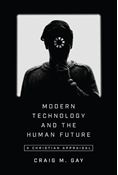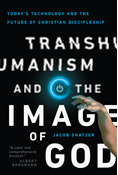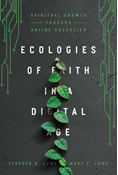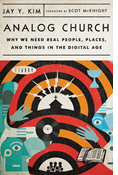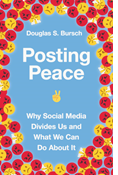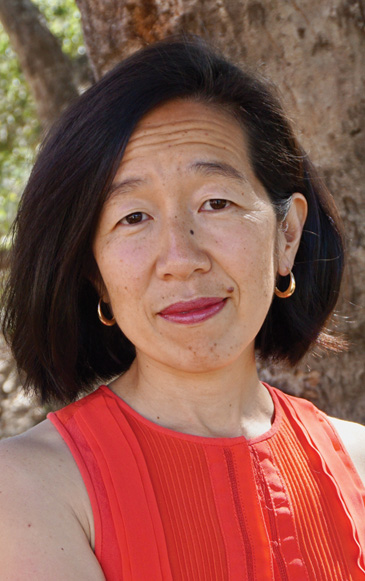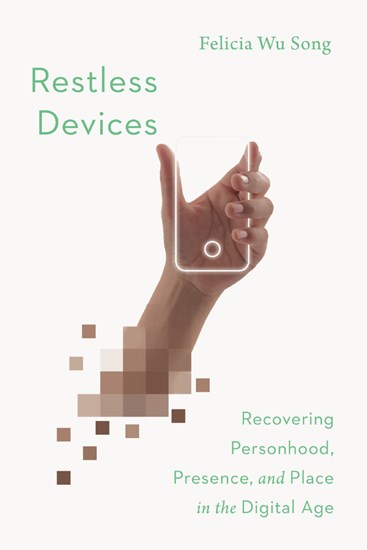
|
Restless Devices
paperback
|
- Length: 232 pages
- Dimensions: 6 × 9 in
- Published: November 30, 2021
- Imprint: IVP Academic
- Item Code: 5113
- ISBN: 9780830851133
-
Other Retailers:
Amazon*
*affiliate partner
-
ebook
We're being formed by our devices. Today's digital technologies are designed to captivate our attention and encroach on our boundaries, shaping how we relate to time and space, to ourselves and others, even to God. Our natural longing for relationship makes us vulnerable to the "industrializing" effects of social media. While we enjoy the benefits of digital tech, many of us feel troubled with its power and exhausted by its demands for permanent connectivity. Yet even as we grow disenchanted, attempting to resist the digital "powers that be" might seem like a losing battle.
Sociologist Felicia Wu Song has spent years considering the personal and collective dynamics of digital ecosystems. She combines psychological, neurological, and sociological insights with theological reflection to explore two major questions:
- What kind of people are we becoming with personal technologies in hand?
- And who do we really want to be?
Song unpacks the soft tyranny of the digital age, including the values embedded in our apps and the economic systems that drive our habits. She then explores pathways of meaningful resistance that can be found in Christian tradition—especially counter-narratives about human worth, embodiment, relationality, and time—and offers practical experiments for individual and communal change.
In our current digital ecologies, small behavioral shifts are not enough to give us freedom. We need a sober and motivating vision of our prospects to help us imagine what kind of life we hope to live—and how we can get there.
"Digital media has shaped our spiritual lives and churches in profound ways, yet we have few guides to navigate this new terrain. I have longed for a book like Restless Devices to be written. Felicia Wu Song compellingly examines the addictive qualities of digital media—its ubiquity and totalizing power. But her depth of expertise and profound Christian imagination allow her to go further than mere critique. She offers us practical hope in the 'counterliturgies' of the Christian faith. I highly recommend this powerful work of spiritual formation to all who seek to live humanely and faithfully in our digital age."
"I have been looking for this book for years. Dr. Song brings the top scholarship and the deepest Christian reflection to bear on the important spiritual topic of how we faithfully engage our devices. In this digital age, which requires new forms of moral and spiritual reflection, there are few topics that could be more relevant or more needed. This is a book I will read again and again."
"Good sociology spurs relevant theological inquiry. Sound theology has powerful sociological implications. Restless Devices has both good sociology and sound theology, making it a prophetic book for our times. I am grateful for Dr. Song's work, which shares how we can move from permanent connectivity with our devices to abiding with Jesus in an attuned, embodied, and collective manner."
"Combining her expertise in sociology and theology, Felicia Wu Song searingly diagnoses the structural problems of the digital world within our culture that idolizes productivity. Restless Devices sparks our imagination in order to free us from our slavery to technology into deeper communion with God and each other. Full of fresh insights and practical experiments, this book helps increase our appetite for being fully human."
"Finally, a book that goes beyond simply lamenting our cyborg-like reliance on soul-hollowing electronic devices. We've all read about the increased distractions, the insecurities, and the polarization (intentionally!) generated by our attention economy. But Dr. Felicia Wu Song offers us something unique: an alternative theology and praxis that doesn't require demonizing or rejecting digital tools. Interpreting our current technological situation within a fully embodied Christian framework that stresses our fundamental need for community, Dr. Song teaches us practical liturgies that lead to true growth within our current context rather than retreating from it. Beautifully written, this is a valuable contribution to Christians navigating our brave new world."
"Engineers may build our digital tools, but we need wise social scientists like Felicia Wu Song to help us understand their wider impact. This timely book not only illuminates the challenges of a society saturated by digital technology but also points a way forward with practical guidance for living faithfully in a digital age."
"Felicia Wu Song begins with an all-too-plausible premise: that today's young people are best understood not as digital natives but rather as an indicator species. If this is the case, perhaps their rising levels of anxiety and loneliness point to a troubling toxicity in our digital ecosystem. Song's pastoral book also guides us toward ways that we can all begin the work of restoring a polluted social ecology so that we might enjoy healthier relationships with one another and with God."
"Dr. Song unpacks a modern digital landscape that is cracked and parched—but she doesn't leave us in our thirst. Instead, she extends her hand and guides us back to the source of living water by way of a well-trodden path she has traveled with her students throughout her professorship. It is a true gift to journey with Dr. Song toward a reimagined relationship with our devices—one where we're transformed less by them, and more by Christ."
"Thanks to Dr. Felicia Song, we now have a spiritual guide through the undiscovered country of life in today's digital colonies. While recognizing the benefits of digital technology, Dr. Song argues that we need more than apps, retreats, and yoga to wrestle with its pervasiveness. We need a vision of our circumstances that helps us imagine what kind of life we hope to live and how we can get there. She finds this vision in liturgical and spiritual formation practices that are grounded in Christian tradition. Dr. Song's diagnosis and prescription is a welcome and much-needed antidote for the technological disenchantment of our times."
CONTENTS
Acknowledgments
Introduction: Confessions
Part I
1. Being at Altitude: Understanding the Digital Ecology
The Freedom Project: Experiments in Praxis: An Overview
2. The Terms of Agreement: What Digital Media Companies Have Known All Along
The Freedom Project: Experiments in Praxis: Stage One: Digital Media Fast
3. The Industrialization of You and Me: How Social Media Makes Relationships a Business
The Freedom Project: Experiments in Praxis: Stage Two: Digital Stocktaking
Part II
4. The Good News
5. Created for Communion, Settling for Connection: A Theological Anthropology
6. Digital Practices as (Secular) Liturgy
The Freedom Project: Experiments in Praxis: Stage Three: Secular Liturgy and Counterliturgy
7. Reimagining Time and Attention: Soul Formation in a Culture of Productivity
8. Embodied and Embedded: Transforming Sites of Faithful Presence and Sacred Spaces
9. The Church as Counterliturgy: Alternative Futures of Faith Communities
The Freedom Project: Experiments in Praxis: Stage Four: Alternative Futures
Index


